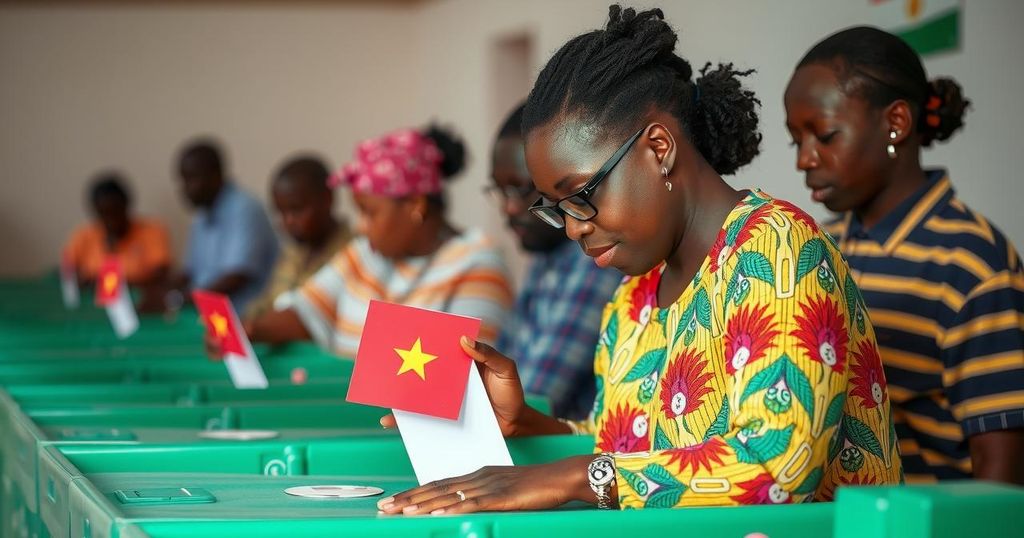Ghana’s Elections Amidst Economic Crisis: A Test for Democracy
Ghana’s presidential and parliamentary elections on Saturday were overshadowed by a severe economic crisis. With 18.7 million voters, the election featured two main candidates: Vice President Mahamudu Bawumia of the NPP and former President John Dramani Mahama of the NDC, both struggling to inspire hope for change. Voter sentiment reveals widespread dissatisfaction with the current trajectory, as economic challenges persist, including high inflation and illegal mining.
On Saturday, Ghana conducted its presidential and parliamentary elections amid a severe economic crisis, marking a critical moment for democratic processes in a region grappling with instability from extremist violence and coups. Approximately 18.7 million Ghanaians were eligible to vote in this general election. However, the primary candidates, Vice President Mahamudu Bawumia representing the ruling New Patriotic Party (NPP) and former President John Dramani Mahama of the opposition National Democratic Congress (NDC), have generated little optimism for effective change.
Once regarded as a shining example of democracy in West Africa, Ghana is currently experiencing a profound economic downturn characterized by high inflation and rampant unemployment. A recent survey by Afrobarometer indicated that 82% of respondents believe the nation is on an unfavorable path. With twelve individuals contesting the presidency, electoral focus has shifted predominantly to the NPP and the NDC, each claiming 137 seats in the 275-member parliament as they vie for control of an additional seat, enhancing the total to 276.
In their concluding campaign efforts, both candidates attempted to convince voters that their respective parties could resolve the nation’s pressing economic issues. Vice President Bawumia, an economist with significant credentials, vowed to advance the economic initiatives of the current administration, while Mr. Mahama advocated for a comprehensive re-evaluation of the nation’s governance and economic policies, claiming, “We need to reset our democracy, governance, economy, finances, agriculture, infrastructure, environment, health sector, and all that we hold dear as a people.”
Despite an electrifying atmosphere during the campaign, marked by public festivities and political advertising, underlying anxieties about the country’s faltering economy were palpable. Ghana encountered a default on significant foreign debts last year, with inflation soaring to 54% and persisting economic burdens reflected in the cost of essential goods. The pervasive issue of illegal gold mining, known as galamsey, has also been pivotal in shaping public sentiment and resonating as a major concern within political discussions.
As Africa’s top gold producer, Ghana faces challenges with illegal mining that have exacerbated environmental degradation and further highlighted the urgency for immediate economic reform. The election outcome will likely determine the trajectory of Ghana’s political and economic landscape at a time of heightened uncertainty within the region.
The context of the Ghanaian general election unfolds against the backdrop of the nation’s worst economic crisis in decades, which has significantly affected public sentiment and raised questions about the country’s political future. Historically, Ghana has been recognized as a stable democracy in West Africa, but rising inflation, high unemployment rates, and a decline in public services have led to widespread dissatisfaction. Surveys show a growing belief among citizens that the country is heading in the wrong direction, necessitating immediate attention and action from its leaders to alleviate these pressing economic challenges.
In conclusion, Ghana’s recent elections represent a pivotal juncture for both the nation’s democracy and economic revitalization amidst a pronounced crisis. As voters cast their ballots, they are not only deciding on their leadership but also voicing their urgent desire for effective economic reform and stability. The outcome of this election will play a crucial role in shaping Ghana’s path forward in a region where democratic ideals are increasingly under threat.
Original Source: www.newsday.com




Post Comment